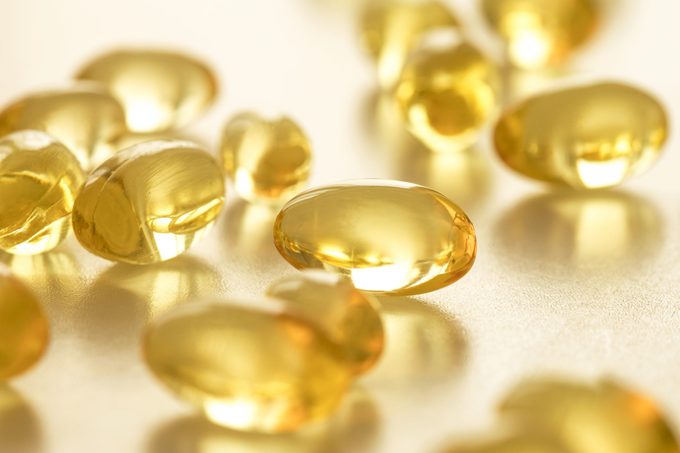The 4 Best Vitamin D Supplements Depending on Your Specific Needs, from Registered Dietitians
Updated: Feb. 01, 2023
Vitamin D is currently all the rage, and for good reasons. Since not all vitamin D supplements are quite the same, shop our nutrition experts' recommendations.
Our editors and experts handpick every product we feature. We may earn a commission from your purchases.
“Should I take a vitamin D supplement?”
Lately there’s been a lot of talk about vitamin D, which might be thanks, at least in part, to its benefits related to immunity and mood. However, vitamin D is also uniquely popular for far more reasons than these. If you know which supplement you need and how to take it, vitamin D can deliver a remarkable number of positive effects to your health.
While there’s a lot to know about vitamin D, here’s a quick overview of facts: While vitamin D is a vitamin, it’s also defined as a hormone that’s acquired through food or produced when the skin is exposed to sunlight (which is why it’s sometimes called the “sunshine vitamin”). Vitamin D is also fat-soluble, which means your body best absorbs it when you take it alongside a small serving of fat (ideally a healthy fat, like avocado, salmon, or nuts). Vitamin D plays a critical role in some of your body’s most crucial functions, such as the absorption of calcium and phosphorus, muscle development, bone health, and, yes, immune support.
The downside is that a reported one billion people worldwide are missing out on these benefits of vitamin D because they’re not getting enough. In many cases, this is due to lack of sun exposure, unhealthy lifestyle, and—as the National Institutes of Health (NIH) points out—vitamin D isn’t found naturally in many foods.
Read below for a helpful guide in determining the best vitamin D supplement for you—and remember that you should speak with your healthcare provider about whether you should make any changes to your diet, including supplementing vitamin D.
What’s the best form of vitamin D to take?
Before you choose any supplement, it’s a good idea to have an understanding of what you’re putting in your body. “Vitamin D” is an umbrella term that includes various forms of the vitamin; the main two being vitamins D2 and D3. Vitamin D2 comes from plants, and vitamin D3 typically from animals.
Vitamin D3 is the most common form found in supplements because it’s often more effective than D2 at raising overall vitamin D levels in your blood. D3 is produced in your body when your skin cells absorb sunlight and is found in animal foods, such as meat, fatty fish, dairy, and egg yolks.
On the other hand, the only food source of vitamin D2 is mushrooms, which can make acquiring it through diet alone quite difficult. So, D2 is typically added to foods and beverages—such as cereals, plant milks, and orange juice—to supplement their nutrition.
A few thoughts to keep in mind about vitamin D3: If you have a vitamin D deficiency, you should speak with a healthcare professional about supplementing with a high dose of vitamin D3. Also, if you’re vegan or vegetarian, you may want to research D3 supplements, as many products source D3 from fish or sheep’s wool. However, recent advancements have allowed manufacturers to produce vegan-friendly forms of vitamin D3 derived from sustainably sourced lichen (we spotlight one of these below). As with any supplement, be a conscious consumer, read the ingredients list, and research a supplement before you buy it. For another alternative, some companies have even produced Vitamin D immunity shots.
With our shopping list below, we’ve done some of that for you.
What strength vitamin D should I take?

“Most experts recommend taking between 600 and 800 IU [International Units] of vitamin D per day,” says Trista Best, registered dietitian and nutrition professor. (This is also the NIH’s recommendation for most adults.) It’s important to note this is the minimum amount to prevent vitamin D deficiency, not necessarily for optimal health. Most supplements will provide 1,000 IU per day, which is appropriate for many adults looking to maintain healthy vitamin D levels.
If you have questions about your vitamin D levels, get a blood test and review the results with your doctor to determine the best approach for you. If you’re deficient in vitamin D, your doctor may suggest that you increase your daily dose to replenish blood levels.
What should I look for when buying vitamin D?
Here are a few points to help you determine whether the vitamin D supplement you’re eying is high-quality:
- Does this vitamin D supplement contain a minimum 1,000 IU? Once more, 1,000 IU is the generally accepted daily amount to aim for. (Also note there are high-dose supplements available ranging from 5,000 to 10,000 IU. Before taking a high-dose supplement, get your levels tested and consult your healthcare provider to avoid the risk of toxicity.)
- Does this vitamin D supplement include a healthy fat source? Since vitamin D is fat-soluble, look for a supplement that includes a healthy fat source in the ingredients. Common ingredients are flaxseed oil, extra virgin olive oil, avocado oil, and coconut oil.
- Does this vitamin D supplement combine vitamins K2 with D3? Vitamin K2 works synergistically with D3 to aid in the absorption of calcium to support bone health, heart health, and immunity.
- Is this vitamin D supplement free from sugar, GMOs, toxins, artificial additives, dairy and soy? Many standard supplements are loaded with unnatural ingredients that are harmful to health. Ensure the product you choose contains non-GMO, organic ingredients and no added sugar or artificial ingredients.
- Does this vitamin D supplement adhere to the FDA’s Current Good Manufacturing Practices (CGMP)? Reputable companies use third-party testing and certifications to ensure their products are safe, high-quality, and free of toxins. Mandy Enright, registered dietitian and author of 30-Minute Weight Loss Cookbook, tells The Healthy, “Supplements are not tested or regulated like pharmaceuticals in the U.S., which means it can be a bit of a wild west with what shows up on the shelves. It’s essential to use a supplement that has been third-party tested. Look for those that have a USP (U.S. Pharmacopeia) logo on them, which indicates this particular supplement has been tested for safety and efficacy.”
The Best Vitamin D Supplements
Choose the supplement that’s right for you based on your doctor’s recommendation. Here are a few of the best vitamin D supplements, based on our conversations with these nutrition professionals.
Nordic Naturals Vitamin D3 + K2 Gummies

Dietitian Enright recommends Nordic Naturals vitamin D3 + K2 gummies because they’re budget-friendly and are found in most major retailers. She also likes Nordic Naturals because the products are third-party purity tested and non-GMO verified.
Each vegetarian, gelatin-free gummy provides 1,000 IU of vitamin D3 to help you hit your daily requirement safely. They also contain 45 micrograms of vitamin K2 per serving to work synergistically with vitamin D3 for bone health, muscle function, and absorption of calcium and phosphorus balance in the blood. This product is gluten-free, dairy-free, and contains no artificially derived colors or flavors.
A couple points to consider with these vitamin D3 gummies: They do not include a fat source to help absorb the D3. They also contain two grams of added sugar per serving (cane sugar and tapioca syrup are the first two listed ingredients)—good to be aware of if you shop for sugar-free products.
Pure Encapsulations Vitamin D3

A recommendation from Best, this product is non-GMO, gluten-free, and hypoallergenic (meaning it’s free from common allergens). She trusts Pure Encapsulations vitamin D3 capsules to deliver high-quality nutrients in optimal amounts.
Each vegetarian capsule contains a whopping 5,000 IU (125 micrograms) dose of vitamin D3. On the other hand, this product doesn’t contain vitamin K2, which enhances your ability to absorb D3. Similar to Nordic Naturals, this product doesn’t contain a fat source. You can take this with food to help ensure absorption.
Pure Encapsulations products are an excellent option if you want high-quality, allergen-free ingredients. These capsules are free from wheat, soy, dairy, eggs, tree nuts, peanuts, gluten, artificial flavors and sweeteners, binders, fillers, preservatives, and trans fats.
Upnourish Liposomal Vegan D3 + K2

Upnourish is a dietary supplement company that says they sell high-quality nutrient and vitamin-rich products that contain healthy, wholesome ingredients backed by scientific research. Each daily serving of this Vitamin D3 supplement contains 5,000 IU.
Upnourish soft gels are non-GMO, gluten-free, soy-free, and produced in a GMP-certified facility. Upnourish uses organic coconut oil as a fat source for better vitamin D3 absorption. Also, each capsule provides 500 micrograms of vitamin K2, an essential nutrient for keeping your bones, heart, and teeth healthy.
The vitamin D3 and K2 within this product are “liposomal,” meaning they’re contained inside very tiny, fat-like particles that allow for easier and more efficient absorption. This supplement is certified vegan with vitamin D3 sourced from lichen.
Bronson Vitamin D3

This USDA-certified organic product delivers 2,000 IU (50 micrograms) of vitamin D3 with each tablet. One point some consumers love about Bronson tablets is that you can get almost an entire year’s supply, 360 tablets, at a competitive price.
Bronson’s vitamin D3 contains the same biological form of vitamin D naturally produced by your body. It’s also free from gluten, soy, wheat, and nuts. The cons of this product are that it doesn’t contain vitamin K2 or a fat source, both of which improve your body’s ability to absorb D3.
Stay connected on staying healthy by signing up for The Healthy‘s daily newsletter and follow us on Facebook and Instagram. Also, keep reading:



















